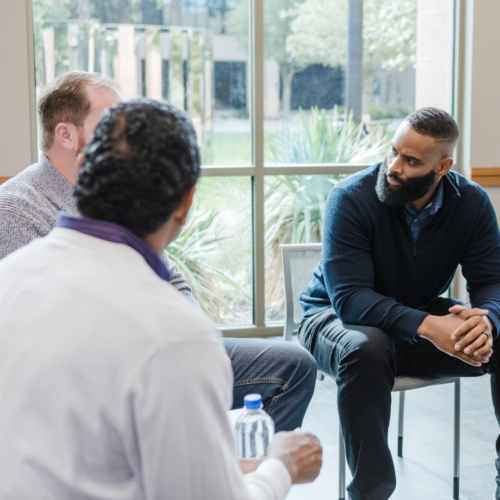
Treatment Services
Our dedicated staff delivers various outpatient treatment services on site and in community locations tailored to meet the unique recovery goals of each individual.
From clinic services, community-based care, and peer support to housing and employment services, our range of programs aim to support an individual’s unique goals and promote independence and recovery.
Reach out to us to better understand our menu of services and determine the best fit for you and your family. Connect with a team member in Westchester by calling 914-345-0700, ext. 7303. Connect with a team member in Rockland by calling 845-267-2172, ext. 296.
Our dedicated staff delivers various outpatient treatment services on site and in community locations tailored to meet the unique recovery goals of each individual.
Our comprehensive range of care management services are aimed at meeting the diverse needs of each individual, enabling them to maintain their well-being within their community.
Our recovery-oriented Support and Rehabilitation Services are designed to assist you in maintaining, regaining, or enhancing skills and functioning for daily living within your community.
Our new clinic in downtown White Plains is dedicated to providing support for understanding, addressing, and coping with substance-related issues. Whether you’re seeking assistance for your own substance use or supporting a loved one dealing with such challenges, we’re here to help.
As part of our many program and service teams, our Peer Specialists, who have personal experience with mental health challenges, offer a unique level of understanding and support.
At Greater Mental Health of New York, we believe that you don’t get better in order to work; you work in order to get better. We offer a variety of employment services to help individuals with behavioral health conditions gain independence through work, helping you to prepare and develop skills for, choose, and maintain meaningful employment.
Our residential programs are centered around the belief that individuals with behavioral health conditions can recover and make choices regarding their living, working, and social environments, allowing them to live the most independent lives possible. We’re here to support you in finding a safe and comfortable place to call home while providing the supports and services for your recovery journey.
Losing someone to suicide is unlike any other loss, and for many people seeking group support, a dedicated program is more comfortable than general bereavement services. Both our Survivors of Suicide (SOS) support group and Postvention Support Services build off of this idea and are specifically meant for individuals who are experiencing grief over the loss of a loved one due to suicide.
Greater Mental Health’s Deafness Advocacy services include case management for adults who are Deaf, education and advocacy services, as well as a social club for people who are Deaf. Our Deafness Advocacy program also hosts the Rockland County Deafness Task Force, a grassroots group of community members and providers who come together to advocate for access and support for Deaf individuals and their families.
Life-changing Peer Services
In an inpatient psychiatric hospital, Henry* met a Greater Mental Health Peer Specialist while preparing to transition back to the shelter system. Facing challenges due to a lengthy history of incarceration and a "high-risk" label, he hesitated to engage formally with our Intensive and Sustained Engagement Team (INSET). However, he asked the Peer Specialist to attend court hearings with him. After two months of consistent support, Henry officially joined the program. A year later, he continues to meet his Peer Specialist weekly, focused on avoiding incarceration and creating a positive future. They attend court together and work on expunging Henry's records for improved housing access.
Removing Barriers to Care
Our HHSA care managers address the comprehensive needs of each individual by facilitating care coordination, collaborating with providers and insurance agencies, providing referrals and linkages to community supports, and helping to remove barriers to fulfilling care and treatment plans.







